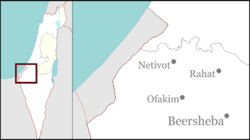- Dorot
-
Dorot Hebrew דּוֹרוֹת Founded 1941 Founded by German Jews Council Sha'ar HaNegev Region Northern Negev District South Affiliation Kibbutz Movement Coordinates 31°30′23.03″N 34°38′43.44″E / 31.5063972°N 34.6454°ECoordinates: 31°30′23.03″N 34°38′43.44″E / 31.5063972°N 34.6454°E Population 454 (2008) Dorot (Hebrew: דּוֹרוֹת, lit. Generations) is a kibbutz in southern Israel. Located on Route 334 near Sderot, it falls under the municipal jurisdiction of the Sha'ar HaNegev Regional Council. In 2008, it had a population of 454.
The village was established during Hanukkah in 1941 by immigrants from Germany, who farmed grain, fruit trees, and vegetables. Soil erosion was a particular problem for the kibbutz. [1]It was named after three members of the Hoz family, Dov, Rikva and Tirtza, who had died in a car accident the year before. The founders were later joined by native Israelis and immigrants from Czechoslovakia and Latvia. In 1947 it had a population of 300. [1]
In the summer of 1946, Doroth and the neighbouring village of Ruhama were occupied by the British army. In their search for illicit arms in the village, the British troops inflicted considerable material damage on the village. [1]
During the 1948 Arab-Israeli war, and the battle for the Negev, Dorot was cut off and had to be supplied by air until it was liberated in October of 1948.
The Jewish National Fund established a forest on the settlement's land called the Pioneer Women's Forest, funded by donor contributions from the U.S.A.
Notable residents include Eliyahu Moyal, later a Knesset member.
External links
- Kibbutz website (Hebrew)
References
- ^ a b c Jewish National Fund (1949). Jewish Villages in Israel. Jerusalem: Hamadpis Liphshitz Press. pp. 32–33.
Kibbutzim Moshavim Other villages Categories:- Sha'ar HaNegev Regional Council
- Kibbutzim
- Kibbutz Movement
- Populated places established in 1941
- Jewish villages in the Mandate for Palestine
Wikimedia Foundation. 2010.

